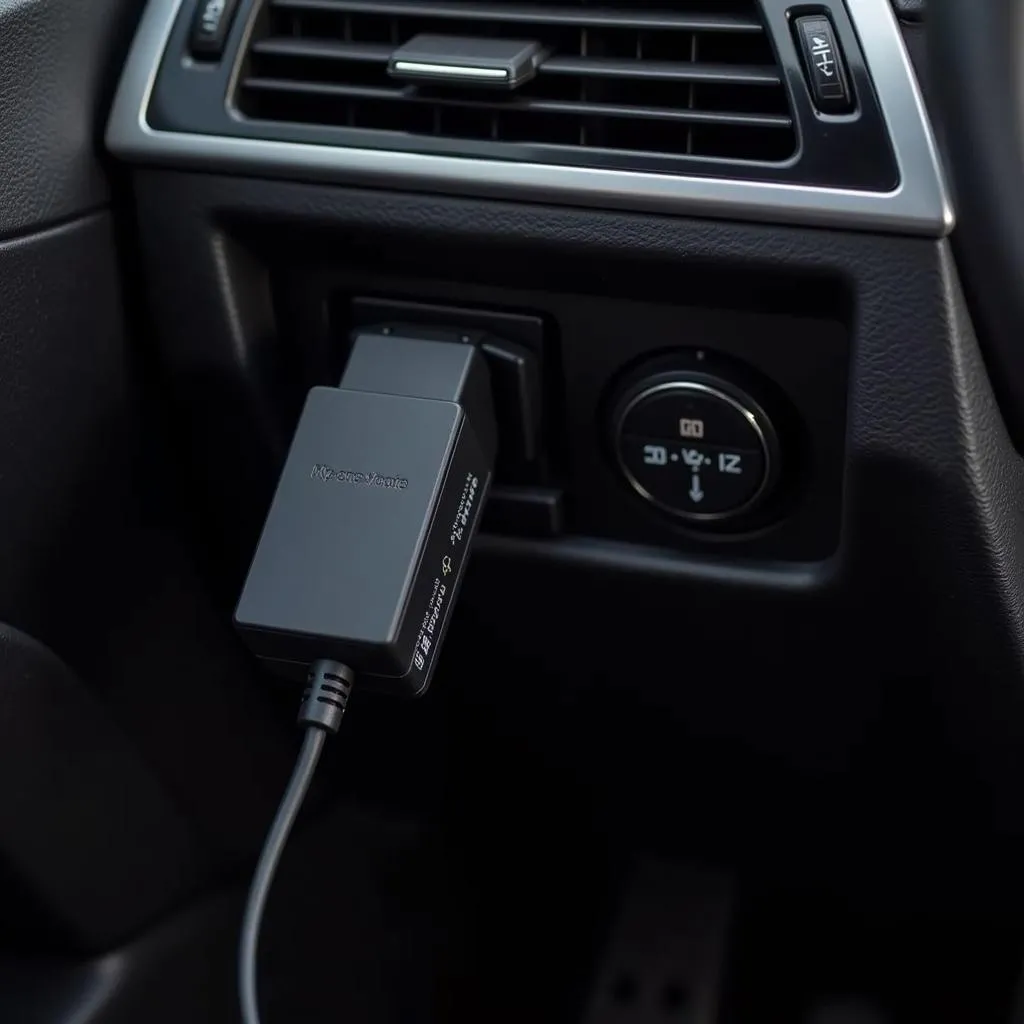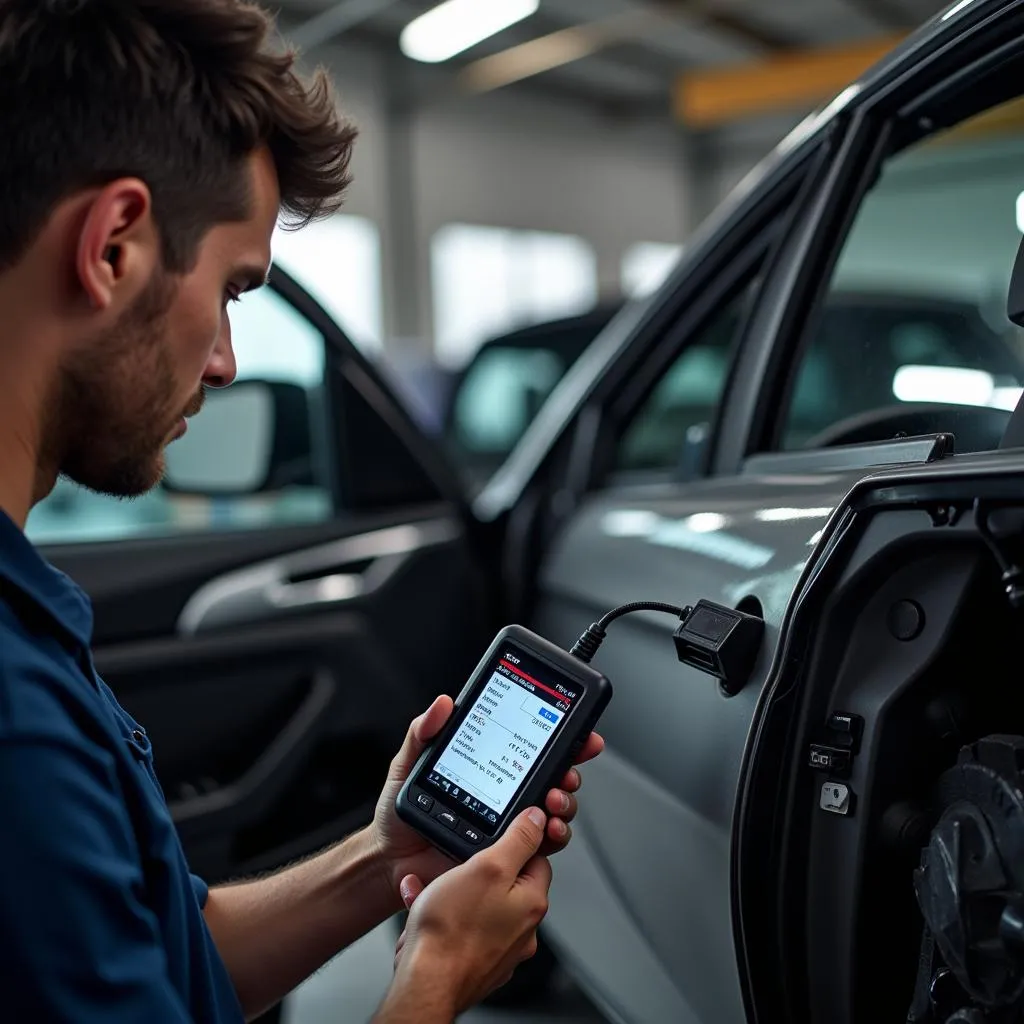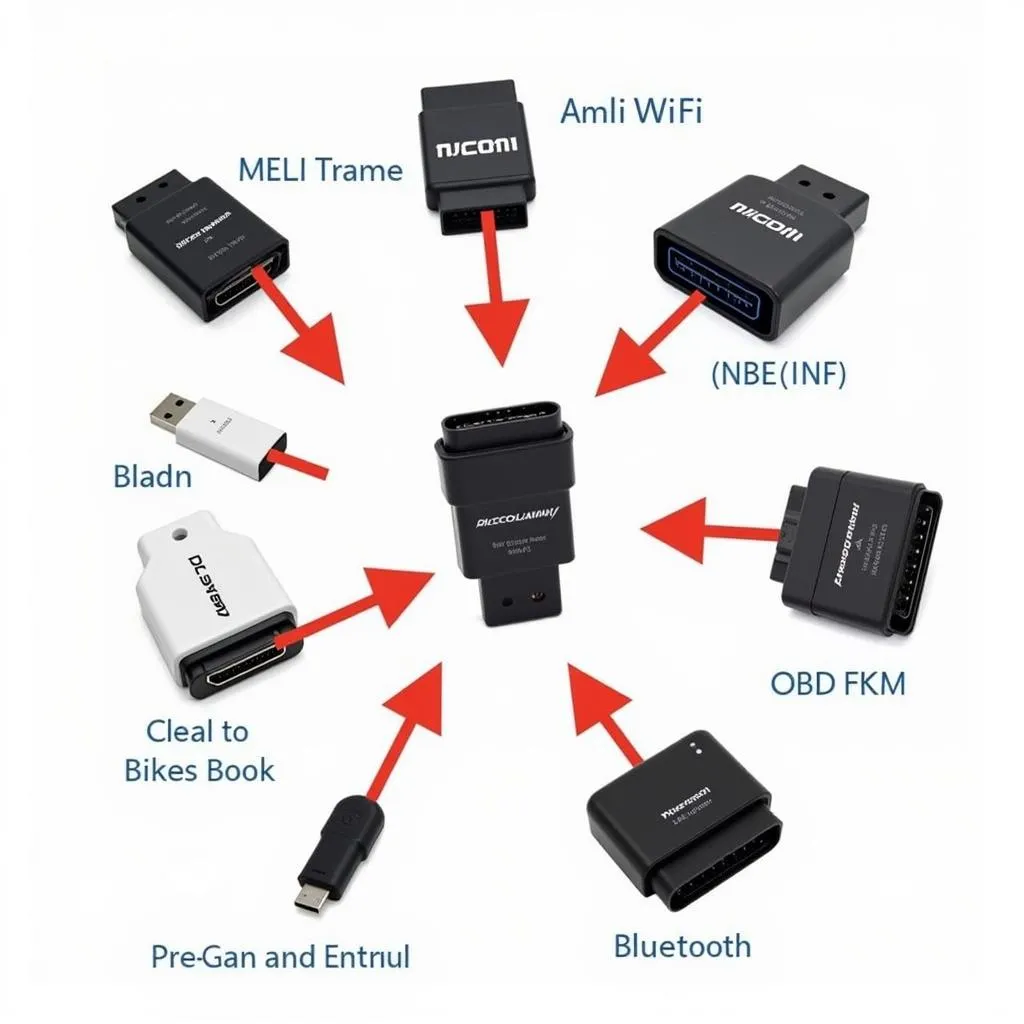A Bmw Obd Wifi Adapter is an essential tool for any BMW owner who wants to keep their car in top condition. By connecting your smartphone or laptop to your car’s OBD-II port, you can unlock a wealth of information about your vehicle’s health, performance, and more. This guide will delve into everything you need to know about BMW OBD WiFi adapters, from understanding their functions to choosing the right one for your needs.
 BMW OBD WiFi Adapter Connected to Car
BMW OBD WiFi Adapter Connected to Car
What is a BMW OBD WiFi Adapter and How Does It Work?
Your BMW, like all modern vehicles, has an onboard computer system (ECU) that monitors and controls various functions. The OBD-II port, a standardized 16-pin connector, provides access to this system. A BMW OBD WiFi adapter acts as a bridge between this port and your smartphone, tablet, or computer. By establishing a wireless connection, it allows you to communicate with your car’s ECU and access diagnostic information.
Benefits of Using a BMW OBD WiFi Adapter
Using a BMW OBD WiFi adapter offers numerous advantages:
- Diagnose Engine Problems: Read and clear diagnostic trouble codes (DTCs) to identify engine issues, often before they escalate.
- Monitor Performance Data: Access real-time data such as engine speed, coolant temperature, oxygen sensor readings, and more, to assess your car’s performance.
- Customize Settings: Depending on the adapter and app combination, you may be able to personalize certain vehicle settings, like automatic door locking or interior lighting.
- Reset Service Lights: After performing basic maintenance yourself, you can use the adapter to reset service reminder lights.
- Save Money: By identifying issues early and performing some maintenance tasks independently, you can potentially save on mechanic fees.
 Mechanic Using OBD Scanner on BMW
Mechanic Using OBD Scanner on BMW
Choosing the Right BMW OBD WiFi Adapter
Selecting the right adapter depends on your needs and budget:
1. Compatibility:
- Model Year: Ensure the adapter supports your BMW’s model year, as communication protocols can differ.
- Software Compatibility: Verify the adapter works with your preferred diagnostic app on your Android, iOS, or Windows device.
2. Features: - Basic Code Reading: Most adapters offer this functionality.
- Live Data Streaming: Essential for monitoring real-time performance.
- Coding & Programming: Allows for vehicle customization but is often found in more advanced models.
- Additional Features: Some adapters offer battery monitoring, trip logging, or integration with third-party apps.
3. App Ecosystem: Explore the features and user interface of apps compatible with the adapter, as this greatly influences the user experience.
4. User Reviews: Read reviews from other BMW owners to gain insights into the adapter’s performance, reliability, and ease of use.
Popular BMW OBD WiFi Adapter Options
- BMWhat WiFi OBD Adapter: This adapter is specifically designed for BMWs and offers a wide range of features, including coding and programming.
- Deep BMW OBD ENET WiFi Adapter: Another popular choice, this adapter is known for its reliability and compatibility with various diagnostic apps.
- Generic OBD-II Adapters: While not BMW-specific, many reputable generic OBD-II adapters work with BMWs, offering basic code reading and live data.
 Different Types of OBD Adapters
Different Types of OBD Adapters
Using Your BMW OBD WiFi Adapter
- Locate the OBD-II Port: In most BMWs, it’s located under the dashboard on the driver’s side.
- Plug in the Adapter: Insert the adapter firmly into the port.
- Connect Your Device: Enable WiFi on your device and connect to the adapter’s network (refer to the adapter’s instructions for the network name and password).
- Launch the App: Open your chosen diagnostic app and follow the on-screen prompts to pair it with the adapter.
Common Uses for a BMW OBD WiFi Adapter
- Check Engine Light Diagnosis: Quickly identify the source of the dreaded “check engine” light and determine if immediate action is required.
- Pre-Purchase Inspection: Before buying a used BMW, use the adapter to check for hidden problems or potential maintenance needs.
- DIY Maintenance: Monitor sensor data and diagnose issues yourself before heading to a mechanic.
- Track Performance Metrics: Log data and analyze your driving habits for improved fuel efficiency or to monitor modifications.
Is a BMW OBD WiFi Adapter Right for You?
If you’re a BMW owner who wants to:
- Take control of your car’s maintenance
- Save money on potential repair costs
- Gain a deeper understanding of your vehicle’s performance
…then a BMW OBD WiFi adapter can be an invaluable investment. It empowers you with the knowledge and tools to make informed decisions about your BMW’s upkeep.
Frequently Asked Questions
1. Are BMW OBD WiFi adapters compatible with all BMW models?
- Compatibility varies depending on the adapter and your BMW’s model year. It’s crucial to check the adapter’s specifications for compatibility information.
2. Can I use any app with my BMW OBD WiFi adapter?
- No, adapters often work with a specific set of apps. Consult the adapter’s documentation for a list of compatible apps.
3. Is it safe to use a BMW OBD WiFi adapter?
- Yes, using a reputable adapter from a known brand is generally safe. Ensure it’s properly plugged in and you’re using compatible apps.
4. Can I leave the adapter plugged in all the time?
- While it’s generally safe to leave the adapter plugged in, it’s recommended to unplug it when not in use to avoid potential battery drain.
5. What is the difference between a BMW OBD WiFi adapter and a professional BMW scanner?
- Professional scanners offer more advanced features, such as module programming and in-depth diagnostics, but come at a significantly higher price point.
6. Where can I find reliable BMW diagnostic apps?
- Reputable apps can be found on the Apple App Store (for iOS) or the Google Play Store (for Android). Look for apps with good ratings and reviews.
7. Can a BMW OBD WiFi adapter help me with coding and customization?
- Some adapters, like the BMWhat WiFi OBD Adapter, offer coding and programming capabilities. However, it’s essential to proceed cautiously with coding, as incorrect modifications can potentially affect your vehicle’s electronics.
Conclusion
A BMW OBD WiFi adapter serves as your key to unlocking your car’s inner workings. By providing access to vital diagnostic information, it empowers you to make informed decisions about your vehicle’s maintenance and performance. Whether you’re a seasoned BMW enthusiast or a new owner, investing in the right adapter and a compatible app, like the BMW E46 OBD app or an ELM327 OBD II app for broader compatibility, can enhance your ownership experience and potentially save you money in the long run.
Remember to select an adapter that aligns with your BMW’s model year and your desired functionality. For general OBD-II needs across different car brands, you might consider options like the IEGeek WiFi OBD, known for its versatility. By harnessing the power of a BMW OBD WiFi adapter, you can become an active participant in keeping your BMW running smoothly for miles to come.
